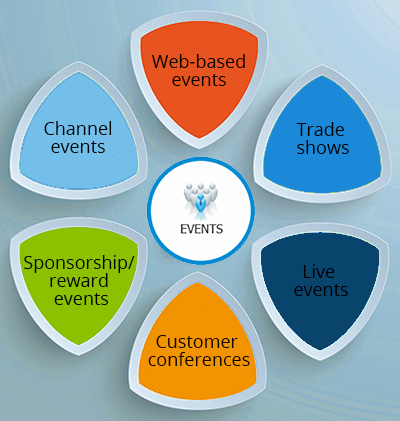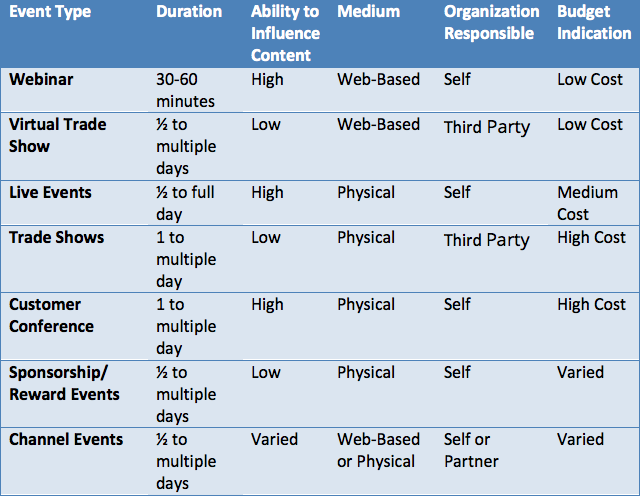Event Types: The What and the Why
- Event strategy often overly emphasizes activity (e.g. number of registrants) vs. outcome (e.g. pipeline impact)
- Nearly all events can be classified into one of six categories
- By understanding event types and their characteristics, marketers can match events to the objectives they best serve
It’s a familiar story. Your sales team has requested more support activity, but what they would really like is for marketing to organize and pay for an event to drive more business. “Yes, we’re here to help,” you say. So, let’s get down to brass tacks. “Who is the target audience?” you ask. “Customers, late-stage opportunities, new prospects – anybody at the nearest bus stop?” To which your sales team answers, “Yes, all of them!”
 Ask yourself this – when it comes to event expenditure and attendance, who within your organization is responsible for determining whether or not a particular event type will be appropriate in achieving the event objectives? Also, by whom and how is a decision made as to whether or not you will participate in event x, or organize event y?
Ask yourself this – when it comes to event expenditure and attendance, who within your organization is responsible for determining whether or not a particular event type will be appropriate in achieving the event objectives? Also, by whom and how is a decision made as to whether or not you will participate in event x, or organize event y?
I’d like to tackle the first problem in this blog and then address the second in my next post. A wide array of possible event types exists. Sadly, with respect to event strategy and execution, we at SiriusDecisions currently see a familiar pattern of too much emphasis being placed upon the activity of an event (number of registrants, etc.) and not enough on outcome (reaching the right buyer, driving pipeline impact). If marketers can marry the “event type” with the characteristics that each display, it is possible to build a ready menu of event suggestions that will be easily understood by all stakeholders and also allow for efficient event selection within the marketing mix. We suggest that nearly all events can be classified by one of the following event types:
- Web-based events: These are online event types such as webinars (interactive in nature), webcasts (lecture format) and “hangouts” (on-camera discussion) that offer the marketer subtle choices. More expansive Web-based events such as virtual trade shows offer attendees and sponsors some of the amenities of a trade show without the cost and time of travel and logistical planning.
- Trade shows: Trade shows are typically theme-based, externally organized events where exhibitors and sponsors compete for the attention of attendees and press. Attendance at such events is done on the premise that potential buyers are known to frequent such shows and effort is expended to enhance the ability of sellers to meet would-be buyers at the event.
- Live events: Live events are designed for either pre-sale activity or are of a post-sale, customer-oriented nature. Whether creating initial demand, building on previous interactions or adding value to an existing customer relationship, the agenda for these events is controlled by the sponsoring organization.
- Customer conferences: These are commonly multi-day events, though a single-day event is feasible. Customer conferences drive loyalty among current customers and educate them about new offerings. The sponsoring organization controls both the content and the attendees.
- Sponsorship/reward events: This type of event relies upon the third-party activity (sporting, cultural, etc.) or the location/activity (reward-oriented) to drive success.
- Channel events: This type of event focuses on supporting the channel business. An externally focused event can be hosted or sponsored by the supplier on behalf of its channel partners. Alternatively, for an internally focused event, a supplier may invite channel partners.
By placing this list of event types against a set of useful characteristics, such as duration, your own ability to determine the content, etc. (see the chart below), it is possible to clearly define which type of event is useful in which circumstances for your organization. By understanding event types and their key characteristics, it is possible to match these to the specific objectives they best serve. Firms can then create a mix that will help them achieve their marketing goals.

